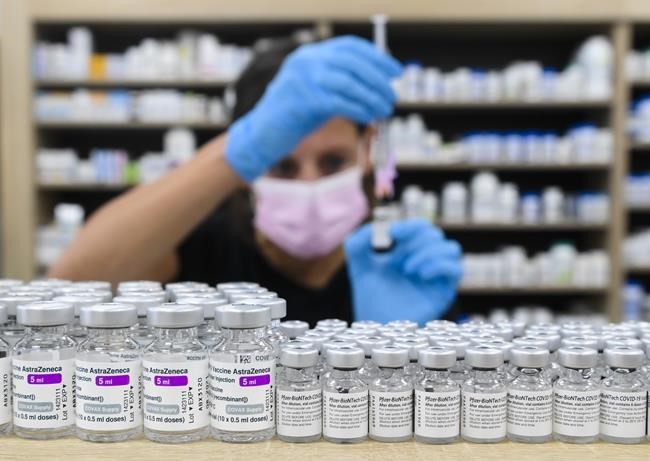OTTAWA — Canada needs to turn its COVID-19 aid attention to expanding vaccine production everywhere or the virus will continue to run wild, mutate and bring new waves of disease, says a prominent expert.
Dr. Madhukar Pai, a Canada Research Chair in epidemiology and global health at McGill University, told the House of Commons foreign affairs committee he doesn't think rich countries like Canada have learned a thing from the first two years of the pandemic.
"The selfishness, greed and myopia of the richest countries in the world that we have seen the naked display of in the last two years, I'm 100 per cent convinced in the next crisis, we will behave the exact same way," he said Monday.
In the rush to get a vaccine to stop the COVID-19 pandemic, wealthy countries like Canada signed multiple advance-purchase agreements with several vaccine makers in a bid to be close to the front of the line when those vaccines were ready for use.
At the same time, Canada and many others signed on to the COVAX vaccine-sharing alliance, the goal of which was to have wealthy countries help less well-off ones buy vaccine doses.
But when the vaccines first arrived, the initial doses were almost entirely spoken for by a small number of rich countries, leaving everyone else to wait.
As of May 5, three in every four people in the wealthiest countries were fully vaccinated and almost half had a third or even a fourth dose. In the lowest-income countries, 12.5 per cent of people are fully vaccinated, and less than one per cent is boosted.
Vaccinations in lower-income countries have picked up, with more than 79 million doses administered in 2022 to date compared with 74.5 million in all of 2021.
A total of 1.4 billion booster shots have been given this year, almost all in high- and upper-middle-income nations.
Vaccine supplies are no longer an issue, with lower demand in high-income countries and more production everywhere. Limiting factors now are getting the available doses into arms before they expire and overcoming hesitancy which in some cases is fuelled by the fact so many people have already had COVID-19.
Pai said if Canada wants to be truly selfish it would do everything it can to get more vaccines into arms everywhere around the world.
The more the virus spreads the more chances it has to mutate, leading to variants like Omicron that are partially escaping vaccine protection. While the existing vaccines still provide excellent protection against severe illness they're not preventing the spread of infection as well as they did with earlier variants, further risking more mutations.
Pai said new variants will keep coming if society doesn't take the needed steps to get more people vaccinated.
'"Can we afford a Sigma variant? Are we ready to go into another lockdown? We are not."
Some vaccine makers, including Pfizer and Moderna, are developing Omicron-specific boosters. But Pai predicts that when those are ready the cycle will repeat itself, with rich countries snapping up all the initial supplies while citizens of lower-income countries will once again have to wait.
Pai is one of several witnesses who told the committee the solution lies in helping make every country able to manufacture or procure their own vaccines.
He said the only way that happens is if a World Trade Organization rule protecting patents for pharmaceuticals is waived for COVID-19 vaccines and treatments, the needed technology information is transferred, and countries like Canada invest in vaccine production hubs to make them.
India and South Africa proposed such a waiver in October 2020, but it was largely ignored for months. A year ago the United States said it would support the idea, but Canada has not moved beyond saying it is "ready to discuss" the notion.
A proposal for the waiver has been made and rewritten multiple times, and the latest version, which would apply only to vaccines at first, won't be discussed again until July.
Canada has donated about $700 million to COVAX, and thus far has shipped 15 million doses from its own supplies. Canada claims its cash donations also allowed COVAX to buy 87 million doses itself, though that number is based on a formula set by the United Kingdom last June, and has not been confirmed by COVAX itself.
Canada promises to donate at least 200 million doses or cash equivalents by the end of the year. Its latest donation of $220 million was intended to help get available doses into arms.
This report by The Canadian Press was first published May 9, 2022.
Mia Rabson, The Canadian Press


